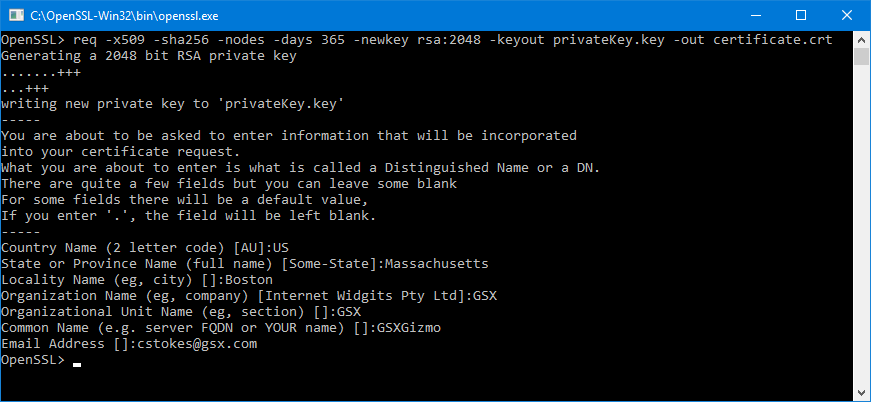If you want to convert your website from HTTP to HTTPS, you need to get a SSL certificate from a valid organization like Verisign or Thawte. You can also generate self signed SSL certificate for testing purpose.
In this article, let us review how to generate private key file (server.key), certificate signing request file (server.csr) and webserver certificate file (server.crt) that can be used on Apache server with mod_ssl.
- Openssl Generate Private Key Pair
- Openssl Get Private Key
- Linux Openssl Generate Private Key From Bitcoin Address
Mar 31, 2018 Generate public key and store into a file. It is a simple one liner command to generate a public key from a private key, so lets say our private key is named ‘user@myserver.key’ and we want to generate the public key and name it ‘authorizedkeys’. Below is the command to do this. When using openssl 0.9.8 to create a new self-signed cert+key, there is a -nodes parameter that can be used to tell openssl to not encrypt the private key it creates.
Apr 15, 2020 The ability to create, manage, and use public and private key pairs with KMS enables you to perform digital signing operations using RSA and Elliptic Curve (ECC) keys. You can also perform public key encryption or decryption operations using RSA keys. For example, you can use ECC or RSA private keys to generate digital signatures. When using openssl 0.9.8 to create a new self-signed cert+key, there is a -nodes parameter that can be used to tell openssl to not encrypt the private key it creates. For example: But with the new openssl v1.0.1, it seems as if the -nodes parameter is ignored. From what I can tell, the private key is always encrypted.
Key, CSR and CRT File Naming Convention
I typically like to name the files with the domain name of the HTTPS URL that will be using this certificate. This makes it easier to identify and maintain.
- Instead of server.key, I use www.thegeekstuff.com.key
- Instead of server.csr, I use www.thegeekstuff.com.csr
- Instead of server.crt, I use www.thegeekstuff.com.crt
1. Generate Private Key on the Server Running Apache + mod_ssl
First, generate a private key on the Linux server that runs Apache webserver using openssl command as shown below.
The generated private key looks like the following.
2. Generate a Certificate Signing Request (CSR)
Using the key generate above, you should generate a certificate request file (csr) using openssl as shown below.
3. Generate a Self-Signed SSL Certificate
For testing purpose, you can generate a self-signed SSL certificate that is valid for 1 year using openssl command as shown below.
You can use this method to generate Apache SSL Key, CSR and CRT file in most of the Linux, Unix systems including Ubuntu, Debian, CentOS, Fedora and Red Hat.
Openssl Generate Private Key Pair
4. Get a Valid Trial SSL Certificate (Optional)
Instead of signing it youself, you can also generate a valid trial SSL certificate from thawte. i.e Before spending the money on purchasing a certificate, you can also get a valid fully functional 21 day trial SSL certificates from Thawte. Once this valid certificate works, you can either decide to purchase it from Thawte or any other SSL signing organization.
This step is optional and not really required. For testing purpose, you can always use the self-signed certificate that was generated from the above step.
Go to Thwate trial certificate request page and do the following:
- Select “SSL Web Server Certificate (All servers)” under the “select your trial certificate”.
- Do not check the PKCS #7 check-box under the “configure certificate”
- Copy/Paste the *.csr file that you generate above in the textbox under “certificate signing request (CSR)”
- Click on next at the bottom, which will give you a 21-day free trial certificate.
Copy/Paste the trial certificate to the www.thegeekstuff.com.crt file as shown below.
If you enjoyed this article, you might also like..
Next post: Google Chrome OS – Beginning of End of Microsoft?

Previous post: Blog Makeover: New Thesis Theme In Action
Lets say you have a private/public key pair that you use to login to your server via SSH and you lose the public key, either it was deleted or corrupt and you don’t want to have to regenerate a new pair what options do you have? In this post I will demonstrate how to regenerate a public key from the corresponding private key that you still have.
Generate public key and store into a file
Openssl Get Private Key
It is a simple one liner command to generate a public key from a private key, so lets say our private key is named ‘user@myserver.key’ and we want to generate the public key and name it ‘authorized_keys’. Below is the command to do this.